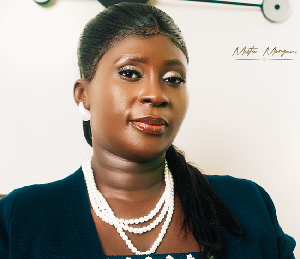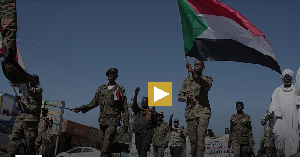On Joy FM’s Newsfile last Saturday, August 10, 2013, I said that the Chairman of the Electoral Commission had himself told the whole nation, two days before the 2012 general elections, that polling agents of candidates must still sign the ‘Statement of Poll and Declaration of Results’ (commonly known as the pink sheet), even if they have concerns over how the election was conducted in their polling station.
This has generated a lot of responses with some accusing me of “fabrication.” Hence, I have attached to this press statement, the relevant audio excerpts from Dr Kwadwo Afari Gyan’s 75-minute interaction with international and local journalists at the GJA’s Editors’ Forum, held at the International Press Centre on Wednesday, December 5, 2012.
Of course, from that pre-polls address to the nation, the statement that has stuck in people’s mind is the following from the EC Chairman:
“Let me also share with you some of the firm decisions we have taken together with the political parties. Now it has become errrm a sing song almost in the street. NVNV! No Verification No Voting! And, by verification we mean that everybody will have to be verified biometrically; except those voters who fall into 2 categories. We know that some of our brothers and sisters who have no hands at all so we cannot, but they are Ghanaians and are entitled to vote. We also know from experience in the field that there were people who had fingers, but we could not capture their fingerprints. Alright, the first category, no fingers at all, we classified them as people who suffer from permanent trauma. People who had fingers but we couldn’t capture their fingerprints, we say you are suffering from temporary trauma. These 2 categories of people are known to the verification machine. We will see F/O; F/O alongside the picture. F/O means ‘face only’. In other words, you are not going to ask when you see ‘FO’ alongside somebody’s picture, you don’t ask for fingerprint. OK? They are in a very small minority, but the rest of us, all of us, will have to be verified not only by our looks but also by our fingerprints, OK? Alright! We have agreed in principle that where the votes found in the ballot box outnumber the persons verified to vote, the result of that polling station will be cancelled. And, somebody asked, what happens if the result is cancelled? We will re-run the election if it will make a difference.”
But, he said a lot more there. On Newsfile, the panel discussion was about the ‘exalted’ status that the respondents in the ongoing presidential election petition place a polling agent as against the ‘observer’ status that the petitioners are maintaining.
Below is what I said, which is a direct quote from what Dr Afari Gyan said at the Editors’ Forum. He was talking about the complaints procedure at the polling station and collation centre and the importance of the complainant arming herself with the relevant documentary evidence. Dr Afari Gyan stated: “The ballots are counted and in every polling station. They are properly signed and a copy of the results is given to the agents. And let me say that, that is the base document for reconstructing the results that has been occasioned where controversy has arisen. We have gone back and taken polling station by polling station results from the agents, compare them with ours, and reconstructed the results. So, if some party, we’ve advised the parties don’t pull off your agents before the end of the day, or don’t tell your agents not to sign because agents refusal to sign does not invalidate the results. It is better to advise your agents to stay there and get a copy of the polling station results.”
His words appear to be in line with the exact wording of the declaration on the pink sheet, which reads: “We, the undersigned, do hereby declare that the results shown above are a true and accurate account of the ballots in this polling station.”
The combined effect of Dr Afari-Gyan’s advice and the wording on the pink sheet is that, in essence, whether or not you disagree with how the election was conducted at the polling station, please sign the pink sheet, take your copy to your principals and let us take it from there.
As it was held in the Nigerian case of Agagu v Mimiko (2009) All FWLR (Pt. 462) 1122 at pages 1193-4, an election petition contesting the results of the governorship election in Ondo State: “It is settled that the polling booths’ results, as set dawn in Form EC8A, is the primary evidence of the votes cast in an election. It is the foundation or base on which the pyramid of an election process is built.”
Again, in another Nigerian election petition, this time of a senatorial contest, Arise v Adetunbi [2011] All FWLR (Pt. 558) 941 at 982, the court described the Nigerian equivalent of the pinksheet (Form EC8A) as “without a doubt, primary evidence of the votes cast at the election. They are, prima facie, the strongest evidence to establish the votes scored by various contestants, all things being equal.”
The EC Chairman, at least until this implications of this election dispute became apparent, had no doubt the significance of signatures in the electoral process. He lawfully denied presidential candidates their constitutional right to be elected President of the Republic because of missing signatures. For instance, Nana Konadu Agyemang Rawlings, who had been duly nominated by her party delegates to be their presidential candidate, was disqualified because her nomination document did not have the full compliment of signatures from two persons from every district as required by Article 63(1)(b) of the Constitution.
Also, at the December 5 Editors’ Forum, during the Q&A, JOSHUA TINGO of the Finder newspaper asked Dr Afari Gyan: “Considering the changes that have taken place over the years from 1992, will you still be using fax machines in the strong room as you have always done?”
The EC Chairman’s response underlined the importance that the Commission attaches to the signatures of its election officers, to the extent that he would ignore complaints from party agents at the EC ‘strongroom’ once he has his signatures.
In response to Mr Tingo’s query, Dr Afari Gyan told the nation: “Are we going to use fax machines? Fax machines have not become obsolete. Yes! We will use fax machines. You see the fax machines are important because we will have to see certain signatures. If you are the returning officer in Enyimo and you send something to us, the reason why we will know that it is you sending it will be your signature, alright? It is to be preferred to communicating on say on the phone. If you say 123, I had written 321, how are you going to know? So put there, sign it and fax it to us, in addition to whatever you are doing. So we will still use fax machines in the strong room. They are still there. This time, when the results come we will make copies immediately and give them to representatives so that, if they are delaying and having their quarrels I could go ahead and declare the results.”
So for the EC to be now running away from the significance it attaches to signed documents is of immense perplexity, coming from a supposedly impartial constitutional body.
Crucial to the issue of the role of the polling agent is the legal step taken by the EC itself in 2012 to, effectively by law, downgrade the polling agent from an election official to an observer.
The Public Elections Regulations, 1996 (C.I. 15), which was repealed by Public Elections Regulations, 2012 (C.I. 75), recognised and treated a polling agent as an “election officer.” C.I. 75, on the other hand, effectively, reduced a polling agent to the status of a mere observer and said so by expressly.
While the expectations of a polling agent appear materially unchanged by C.I. 75, Regulation 19(4) of C.I. 75 introduces a new provision (which was not in C.I. 15), which narrowly circumscribes the delimitation of a polling agent. It reads: “A presiding officer shall give a polling agent the necessary access to enable the polling agent to observe election proceedings at a polling station.”
The practical significance of this downgrade became obvious when the New Patriotic Party, for example, was frustrated by the operation of C.I. 75 in the party’s cyclical efforts to freely and efficiently deploy polling agents in areas the party considers as “difficult” during general elections. In previous elections, the party was able to register carefully selected trusted members (especially members of TESCON, its youth organ in tertiary institutions) as polling agents, get them to vote earlier as “special voters” and send them out, strategically, to selected polling stations as polling agents.
But, C.I. 75 no longer recognises polling agents as “election officers”, and, by that, it has disqualified them from inclusion on the “special voters list”. To downplay this legislative downgrading is to miss the serious damage that the EC did with C.I. 75 to the capacity of political parties and candidates to monitor elections.
Regulation 48 (the Interpretation section) of C.I. 15 defined an “election officer” to mean: “a member of the Commission, or any other person authorised by the Commission to be present at a polling station in an official capacity.”
It also defined a “special voter” to mean: “a person registered as a voter who is (a) a security officer; or (b) an election officer; or (c) certified as such by the Commission.”
This meant that the EC effectively authorised a polling agent, who is present at a polling station in an official capacity for her candidate, as an “election officer.”
This is, however, not the case with C.I. 75. The Interpretation section of C.I. 75, Regulation 47(1), defines an “election officer” as “a member of the office of the Commission, or any other person engaged by the Commission to be present at a polling station in an official capacity”. It substituted ‘authorised’ for ‘engaged’.
C.I. 75 also defines a “special voter” as “a person registered as a voter who is (a) a security officer, or (b) an election officer.” The ‘C’ in C.I. 15 was deliberately deleted in C.1. 75. To appreciate this dinstinction is to appreciate the fact that a polling agent is authorised by the EC, through the signature of the constituency returning officer, to be present at the polling station. On the other hand, a presiding officer and her subordinates are engaged by the EC, through its District Officer, to be present at the polling station. Engaged is to be employed.
Thus, while the preceding law, C.I. 15 defined an “election officer” to include a person “authorised” by the Commission to be present at a polling station in an official capacity, C.I. 75 limited the position of an election officer to persons engaged by the Commission to be present at a polling station in an official capacity.
For the 2012 general elections, this provision was, accordingly, interpreted by the EC to exclude polling agents from registering as “special voters” and to consider them no more as “election officers” but “observers,” and, accordingly, denying them the opportunity to register as “special voters”.
The practical problems associated with this became clear in 2012 when candidates were forced to recruit their polling and counting agents for the 26,002 polling stations narrowly from the areas that the recruited personnel were to operate on polling day. To do otherwise, for a big party like the NPP, is to deny yourself of potentially a maximum of 56,000 votes, a number much larger than the margin of defeat the party suffered in the 2008 presidential race.
Indeed, media houses also complained that because C.I. 75 took the privilege to register as a special voter from journalists, they were also having difficulties deploying competent personnel to cover the election across the country. Thus, journalists were reduced to voting in their designated polling stations before setting out to cover the election in their designated areas of assignment.
Moreover, Regulation 21(2) of C.I. 15 (on Special Voters List) allowed an application for a “special voter” to be made as late “seven days before the polling day in the constituency of the applicant…” However, the new law, C.I. 75, effectively took several players, especially journalists, who were used to applying to register one week before a general election, by surprise., when it was clear by the end of November 2012 that the deadline for registering as a “special voter” had expired a month earlier, even for the newly limited class of “special voters”, excluding polling agents and journalists. Regulation 21(2) of C.I. 75 provides that an application to be on the “special voters list” shall be made “not later than forty-two days before the polling day in the constituency of the applicant…”
I believe strongly that the EC took a deliberate step with C.I. 75 to effectively reduce the role of polling agents to mere observers as opposed to election officers. Notwithstanding, not even the previous law, C.I. 15, operated to put the role of a polling agent on the kind of mandatory scale that a presiding officer has been put on by Article 49 of the Constitution.
Public elections in Ghana are run by the EC and it is, therefore, its responsibility to conduct elections in compliance with the Constitution and the laws of the land.
As Dotse, JSC, said in the 2009 Supreme Court case of the Republic v. High Court, Koforidua, ex parte Dr Kofi Asare (the then MP for Akwatia against the suit by Baba Jamal): “Where a statute has made provisions for certain steps to be taken in order to comply with the requirements of the law, then no other steps other than those prescribed must be taken or followed.”
The same way the EC cannot use discretion to water-down the ‘NVNV’ principle, it cannot also say the presence of polling agents’ signatures can validate an illegality.
The author is a barrister and executive director of the Danquah Institute, a policy think tank in Ghana. gabby@dnaquahinstitute.org
Opinions of Monday, 12 August 2013
Columnist: Gabby Asare Otchere-Darko















